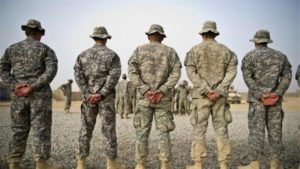
In the U.S. Air Force, Black airmen were 71 percent more likely to face court-martial or nonjudicial
punishment than white airmen. (Image courtesy of Special Ops Mag)
Black service members are far more likely to face a court-martial or other forms of military discipline than their white comrades, according to a new report by advocacy group Protect Our Defenders.
After combing through Pentagon data from 2006 to 2015, researchers found that, across all branches, Black servicemen and women were at least 29 percent more likely, and as much as 2.61 times more likely than white service members to have some form of disciplinary action taken against them in an average year. The disparities haven’t improved, the report stated, and in some cases have worsened, in recent years.
“Military leadership has been aware of significant racial disparity in its justice process for years, and has made no apparent effort to find the cause of the disparity or to remedy it,” authors of the new report wrote. “The leadership has vigorously opposed any suggestion that the commander-controlled justice system is hindered by conflicts of interest or bias and has gone to great lengths to tout the fairness of the system.
“However, the military’s own data raises serious challenges to the idea that the system in its current form is capable of delivering impartial justice,” they continued.
The report, released Wednesday, June 7, indicated that Black airmen of the U.S. Air Force were, on average, 71 percent more likely to face court-martial or Non-Judicial Punishment (NJP) than white airmen. Airmen of other races, or whose race was unknown, also had higher court-martial and NJP rates than their white peers.
In the case of the U.S. Marine Corps., Black Marines were 2.61 times more likely than white Marines to be found guilty at a general court-martial proceeding, which is used for the most serious offenses, and 29 percent more likely to receive a guilty finding at an NJP hearing.
The U.S. Navy provided disciplinary records only for 2014 and 2015, which indicated that Black sailors were 40 percent more likely to be referred to a special or general court-martial than white sailors. They also were 37 percent more likely to have disciplinary action taken against them in an average year, according to the report. But study authors noted that the disparity between Black and white service members nearly disappeared when looking only at “post-referral outcomes.”
“Black sailors were about equally likely as white sailors to be diverted from harsher military justice action or to receive a conviction at special or general court-martial,” they wrote. “However, because Black sailors were initially referred at higher rates, they remain disproportionately impacted by the military justice system.”
Last but not least, the report found that Black soldiers in the U.S. Army were 61 percent, more likely to face a general or special court-martial compared to white soldiers. The disparity between Black and white service members in this branch ranged from 34 percen to 82 percent more likely in any one year, the report stated.
Pentagon spokesman Johnny Michael told USA Today that federal officials will review the report.
“It is longstanding Department of Defense policy that service members must be afforded the opportunity to serve in an environment free from unlawful racial discrimination,” Michael said. “The department will review any new information concerning implementation of and compliance with this policy.”
For former Air Force prosecutor Don Christensen, the findings of the report were “disheartening” and spoke to the larger issues of bias and lack of diversity within the four military branches.
“If you look at the leadership of military, it skews very dramatically white and male and you would imagine that the closer relationships will be with white male subordinates,” said Christensen, who also serves as president of Protect Our Defenders. “Hence, they probably get the benefit of the doubt that the African-American males don’t.”
“This report cries out for action,” he added.
To address the disparities in military justice, the advocacy group suggested that:
- The military justice process be reformed to empower legally trained military prosecutors, instead of the commander of the accused, to determine when to refer a case to court-martial, thus reducing the potential for bias based on familiarity, friendship, race or ethnicity
- Each branch of the military collect and publish consistent racial and ethnic data regarding military justice proceedings and outcomes
- Data be tracked for victims of crimes to determine whether there might be bias regarding victims of particular races/ethnicities
- Research be conducted to determine the underlying causes of existing racial/ethnic discrepancy within military disciplinary and justice systems and to explore steps that can be taken to address inequities


